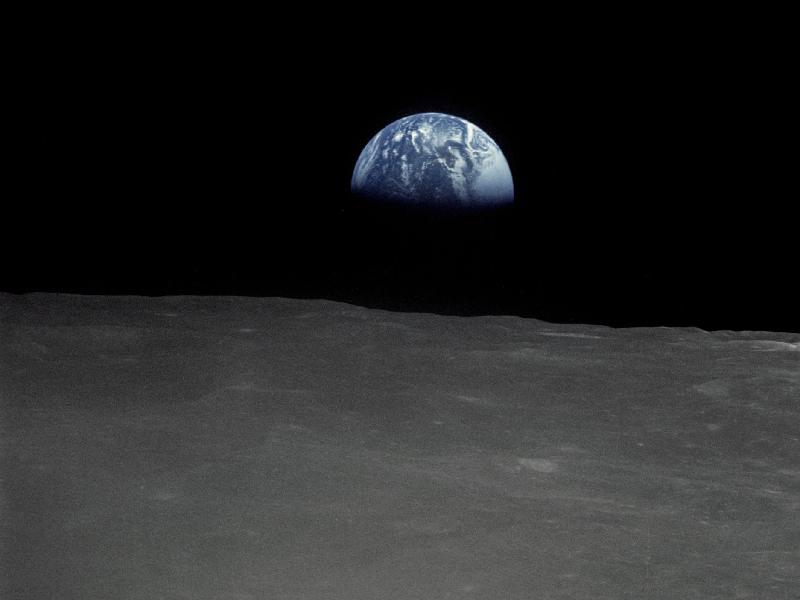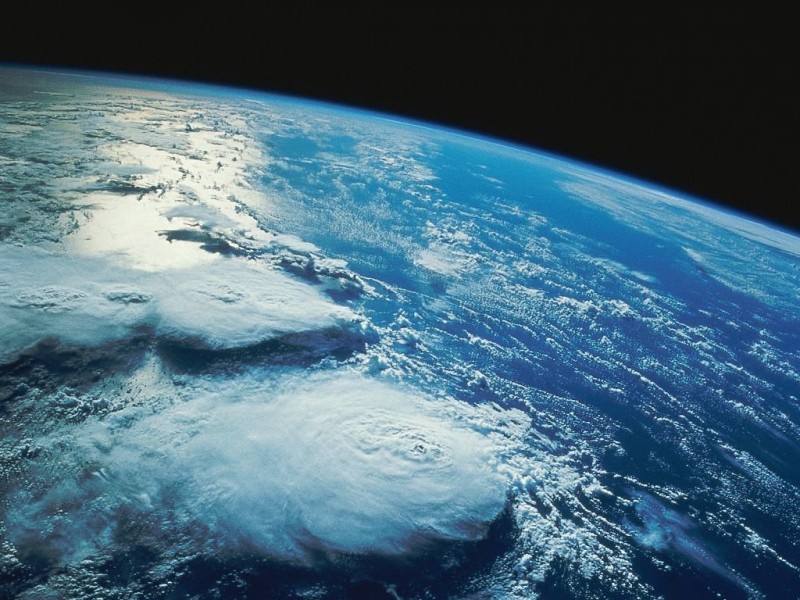
The Apollo 16 crew captured this Earthrise in 1972. // Photo: NASA
Our home on planet Earth: Why it’s time to return to the local
The following was written by Senior Scholar Rod Kueneman, department of sociology. He originally wrote this in 2011 for a regular feature the U of M and the Winnipeg Free Press once collaborated on called the Learning Curve. We think it’s still timely, so we share it again on Earth Day 2016.
The soil is warming and the arrival of this year’s growing season once again provides an opportunity to focus on our home planet − its needs, its health, and its ability to continue to support a vibrant community of life.
There is much to be amazed by when we reflect on the miracles of nature that flourish within the atmosphere encircling the Earth. And yet there are growing signs that the biosphere’s future will be increasingly unstable, and that the next twenty years will not be like the last twenty. The nature/human interface is seriously out of balance and the conditions for supporting life on this planet are deteriorating at an alarming rate.
The question arises: how can we, as individuals, realize our commitment to environmental protection and sustainability? And how do we scale these efforts to respond to the developing ecological crisis? Unfortunately, recycling and the use of hybrid cars and LED light bulbs are not enough.
The elephant in the room
We have been encouraged to think that the central ecological challenge of our time is global warming. But climate change is an “effect” driven by two primary underlying “causes” that no one really wants to talk about: an unsustainable exponential growth of human population and an equally unsustainable exponential growth of consumption. Let’s reflect on consumption, which is a major problem for developed countries such as Canada.

“We have been encouraged to think that the central ecological challenge of our time is global warming. But climate change is an ‘effect’ driven by two primary underlying ’causes’ that no one really wants to talk about…”
The current economic system is said to require at least 3% growth per year. This kind of growth in production creates jobs but it also uses increasing amounts of energy as well as renewable and non-renewable resources. It releases much more carbon and waste than nature can manage.
And on the consumption side, we are hounded by advertisers to seek happiness by buying more “stuff.” Accumulating more things (and credit card debt) is supposed to be a quick fix for the isolation and drudgery that flows from doing work that we would never choose if we didn’t have bills to pay. Our struggling ecosystem cannot support this growth.
As reports of planetary distress become more strident, it is important to remind ourselves that no human economy can survive in the long run unless it fits within nature’s carrying capacity. So what kind of growth is a sustainable pathway to human satisfaction and personal well-being? Well, we can work to deepen our capacity to be patient, empathic, generous, and cooperative. We can develop our musical and artistic talents. We can foster playfulness and humour in our interactions with others. We can sharpen our powers of reasoning and communication. And we can expand our capacity for self-reliance by learning trades and crafts. These are all ways to grow our personal wealth and quality of life that have very small ecological footprints.
We can increase this wealth every day, and we do not need to travel to some far away place to do it. It is important to understand that “peak oil” means that there will be less fossil fuel energy in the future, and that it will become very expensive to use it for other than essential purposes. This change means that we will spend much more of our leisure time closer to home.
The return to the local
In the event that the world economy becomes seriously disrupted, we may also end up doing more work ourselves. We will grow more of the food we eat and make more of the goods we need locally as well. The rising energy costs associated with the global supply chain will make using it a financial liability. In this context, it makes sense to celebrate the “return to the local” as a way to improve our personal lives and those of our children, while also contributing to the well-being of the planet and our communities.
We should not think of this return as some kind of deprivation. Sharing what we have and what we know with neighbours will enrich each of us and expand the pool of resources that we can rely upon. As our communities become more robust, bustling and creative places, we will want to make our own contribution.
The looming energy and resource shortages, the threat of growing food insecurity, and the ensuing disruption of the world economy are all consequences of living unsustainably on a finite planet. But they are not only threats. They are opportunities for us to better our personal lives, the lives of our families and the lives of our communities. They are also a call to restore the health of the planet by lowering our demands on it and by building self-reliant, local communities.
These are things worth reflecting upon as the plant world explodes with brilliant colour and vigour. This eruption of renewed vitality invites us to try to imagine what we can change in our lives to make a positive contribution to a sustainable kind of growth.







Brilliant piece. Very well stated in a very succinct fashion. You are exactly right about the elephant in the room. It seems that not even the most impactful or progressive organisations want to talk about over population and consumption anymore, because people simply aren’t receptive to those messages. We’re living in a world that’s out of control, and yes, we will at some point need to return to loving locally whether we like it or not. Great piece. Thanks very much.